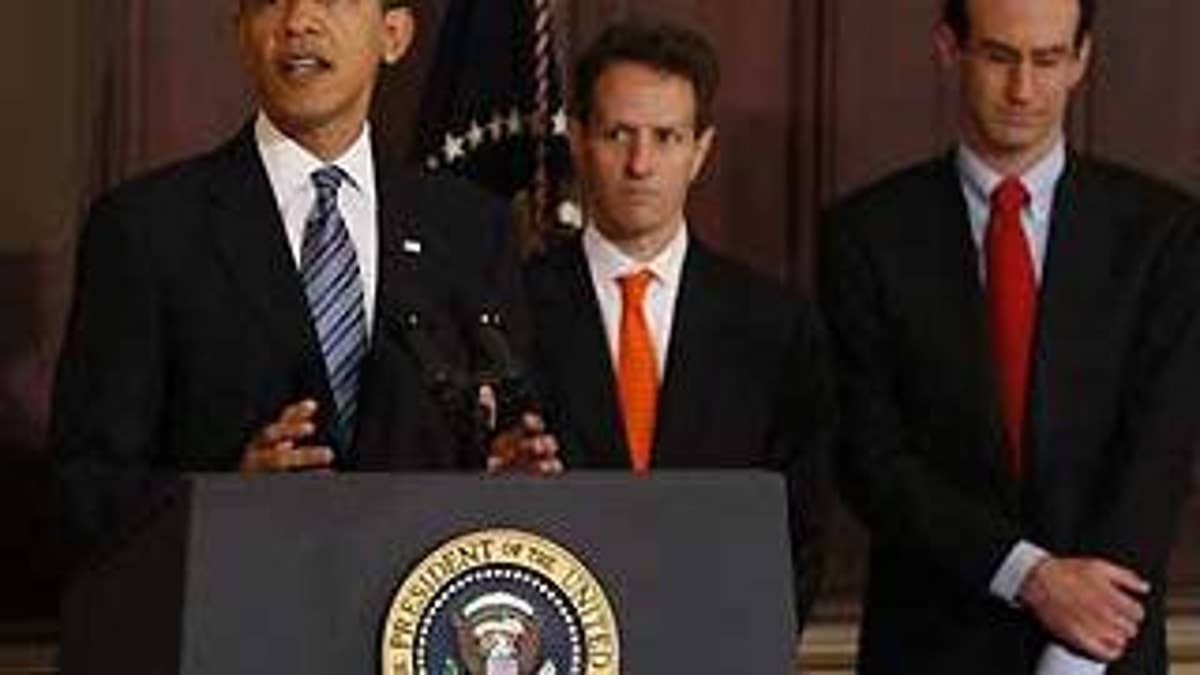
Wall Street, $700 billion. Main Street, $787 billion. Auto industry, $17.4 billion. Advice from economists, priceless.
As the federal government unleashes breathtaking amounts of money to try to get control of the deepening recession, some economists are proposing low-cost solutions that transcend the tax-cuts-vs.-spending partisan debate.
FOX Forum: Ditch Private Mortgage Insurance
The proposals range from shoring up the housing market to urging the media to tone down the dramatic coverage of the crisis.
President Obama on Wednesday launched a $75 billion program designed to help up to 9 million borrowers stay in their homes through refinanced mortgages or loans that are modified to lower monthly payments.
But University of Chicago professors Eric Posner and Luigi Zingales offered what they described as a no-taxpayer-cost plan that would require the government to force lenders to reduce mortgages for all homeowners who live in a neighborhood where house prices have dropped more than 20 percent of the market value of the house.
"In exchange, these homeowners would yield to their lenders 50 percent of the future appreciation of the house," they wrote in an article for Slate this week.
"This plan is very low-cost," they wrote. "It could be introduced as a prepackaged bankruptcy, requiring just a judicial stamp of approval."
Posner and Zingales noted that Congress is considering similar plans that would allow homeowners to enter Chapter 13 bankruptcy to reduce their mortgages to the market value of the house.
"But Chapter 13 cases are slow and expensive, and the country's few hundred bankruptcy judges cannot handle millions of these full-blown proceedings," they wrote.
"Our plan, by contrast, is quick and dirty: It strips away the irrelevant elements of Chapter 13 as well as relying on zip code-level housing price indexes to deal with appraisals."
Dean Baker, co-director of the Center of Economic and Policy Research, released a plan nearly two years ago that would allow subprime borrowers facing foreclosure to stay in their homes and pay rent at a fair market rate. Judges would oversee the changes, as they do in foreclosures.
"By allowing homeowners to stay in their house as renters, this plan will help to prevent the sort of blight that often afflicts neighborhoods with large numbers of foreclosures," Baker wrote in August 2007.
"Homes will remain occupied, and long-term renters will have an incentive to keep up the appearance of the property. This should help to sustain property values for whole neighborhoods," he wrote.
Baker told FOXNews.com that Republicans have shown interest in his proposal, but it hasn't gained steam among Democratic leaders.
Baker said he believes political leaders may be wary of his plan because of their desire to preserve home ownership. But that desire is hard to defend, he said, when homeowners end up in foreclosure and are forced to move.
"How have we helped that person?" he asked.
One economist gave Baker's proposal a ringing endorsement.
"I think Dean's idea is very good because it gives banks a good incentive to do a mortgage workout," said Josh Bivens, an economist with the Economic Policy Institute. "It's gotten far less attention than it deserves."
Obama's housing plan has suffered no shortage of attention. The program, which was launched Wednesday, has two parts: one to work with lenders to modify the loan terms for up to 4 million homeowners, the second to refinance up to 5 million homeowners into more affordable fixed-rate loans.
Borrowers, who will need an "affidavit of financial hardship" to qualify for the loan modification program, are allowed to have their loans changed only once.
Lenders could reduce a borrower's interest rate to as low as 2 percent for five years. Rates would then rise to about 5 percent until the mortgage is repaid.
Tens of thousands of homeowners in some of the most battered real estate markets -- concentrated in California, Florida, Nevada and Arizona -- won't be eligible for the two programs. There was also skepticism that banks would be willing to participate.
Kevin Hassett, director of economic studies at the American Enterprise Institute, a conservative think tank, says the mainstream press could help fix the economy by curtailing its "sensational" coverage of the recession, which in turn would help restore confidence to the markets.
"The press is feeding the panic," Hassett said, citing reports this week that auto sales had plunged by at least 40 percent from last year. He noted that auto sales have remained relatively stable since October.
"We know the economy tanked in the fall," he said. "But to make a headline over a year-to-year comparison is kind of irresponsible."
The Associated Press contributed to this report.




